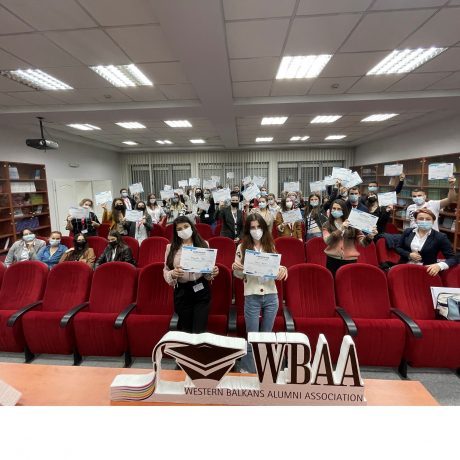WBAA Project "Modernisation in Higher Education Institutions in Western Balkan in Terms of Digitalisation" ended successfully

The project on the topic Modernisation in Higher Education Institutions in Western Balkan in Terms of Digitalisation ended successfully. 50 participants from the University “Goce Delcev” in Shtip, the University “Ss. Cyril and Methodius” in Skopje, the University “St.Clement of Ohrid” in Bitola, International Slavic University in Sveti Nikole, University American College Skopje, the University of Sarajevo in Bosnia and Herzegovina, the University of Kragujevac in Serbia and the University of Vlora "Ismail Qemali" took part in the project.
The participants of this project included both students and university staff who had the opportunity to learn about digital tools used in higher education. Additionally, the lecturers who were part of the project Prof. Zoran Zdravev and Prof. Misko Dzidrov gave the participants unique insights into the digital situation in higher education in a broader context but also in a more localized context with examples from the hosting University Goce Delcev (UGD). Participants had the possibility to practically try out tools in the centre for electronic learning at UGD which was very interesting and insightful.
During the project, the participants worked on new methods and tools that can be used in higher education. Institutional coordinators from the Western Balkan Universities spoke and discussed the Erasmus+ dashboard and integration of the Erasmus+ program in the strategy for digitalization. The project was kicked off by the project facilitator Marija Vasilevska and was focused on identifying and discussing challenges as well as new ideas on how to implement the processes of digitalization on a university level.
One of the key components of solving the digitalization challenges is a collaboration between students, staff and university management. Strategic orientation was also one of the key elements of the discussion because if strategic orientation is not present, we cannot direct our efforts into the innovative practices of digitalization. As discussed, digitalisation in higher education requires a lot of strategic and policy support as well as funding.
The training included two presentations about digitalization at the UGD led by Prof. Dr. Zoran Zdravev and Assoc. Prof. Misko Dzidrov. A Special guest at one of those presentations was the Head of Higher Education at Microsoft Elisaveta Noykovska who joined the presentation through Microsoft Teams. In the first presentation, Prof. Zdravev spoke about Moodle at UGD and the specialized e-learning centre which supports the university. In the e-learning activities maintenance and full cloud accessibility - for example supported by Microsoft Azure systems - are very important when it comes to digital resources for teachers and staff.
The second presentation was held by Assoc. Prof. Misko Dzidrov, who spoke about the unique opportunity for online application at the University. The University was on a continuous learning and improvement curve which was filled with questionnaires, student feedback and staying on schedule with exams and other study requirements. The current situation at the university is a hybrid semester: small groups are now allowed back in the classroom. He also spoke about the collaboration of UGD with Coursera as well as their extended cooperation with Microsoft. Elisaveta Noykovska joined our conversation live from Athens and she presented to participants the Microsoft Learn Platform which is free of charge for all interested learners. Additionally, she presented the Microsoft Learn Student Ambassadors Programme and Microsoft Virtual Training Days which will hopefully inspire students and participants to join these free and globally acclaimed programmes.
Prof. Dzidrov spoke about the rapid transformation and merge of the faculty in just about one weekend to fully go from on-site to online learning. He presented the electronic index that is availabe for students and professors to track and monitor exams, grades, documentation, administrative processes and an integrated payment system for fees. The professor also mentioned the necessity of students, staff and university cooperation to invest in themselves and their digital opportunities.
Aleksandar Davkov, Project Coordinator
Text edited by service provider